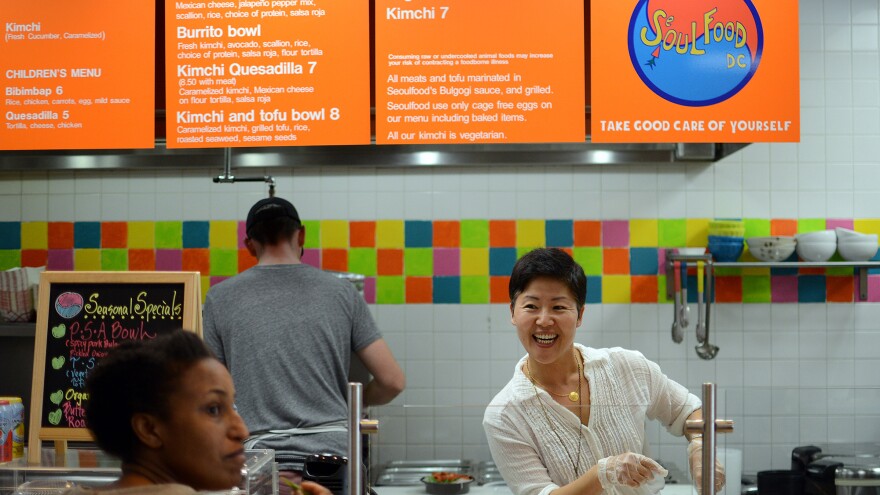Gas stations have long been synonymous with cold pizza, dried-out doughnuts and mediocre hot dogs rotating on unappetizing roller grills. But in cities like Miami, Kansas City, and even Saxapahaw, N.C., among others, patrons can fuel up on gourmet grub and top off their tanks in one stop.
Gas station food, when done right, can rival your favorite five-star eateries. In South Florida, places like Miami's El Carajo International Tapas and Wines, a well-known bakery/wine store/restaurant nestled inside a CITGO filling station, are redefining the possibilities of what a gas station can offer.
After spending years in Italy, owner Richard Fonseca, who operates El Carajo with his wife and three sons, got the idea to turn his humble gas business into a high-quality, sit-down restaurant. "In Italy," he tells The Salt, "when you stop at a gas station, you can get a gourmet bottle of wine."
That love of food and wine, along with his entrepreneurial savvy, gave birth to El Carajo, where chef Luis Barbosa mans the kitchen, preparing some of the best tapas, paellas and delectable cakes around. It's been praised for its grilled meats and "heaping entrees." So relax and fill up your car — and your belly.
There is also Whoa Nellie Deli in Lee Vining, Calif., something of a local culinary fixture set on a hilltop on the edge of the Sierra Nevada. Open since 1996, it operates out of a Mobil station and turns out everything from vegetarian chili to wild buffalo meatloaf and fish tacos. Oh, and the view. THE VIEW.
So what's driving this trend toward gas stops with culinary ambitions?
Gas stations for a long time have been a low-margin business. Owners typically make their real profits not on fuel sales but on the snacks and other items customers purchase when they come inside the station. These latest gas station eats are just taking that business model up a notch or two.
Jeff Leonard of NACS, a trade group representing convenience store owners and gasoline retailers, says these small-business owners are in need of something else to drive profits, and "food is increasingly a great way to do that." Owners are teaming up with chefs who are themselves looking to take advantage of more affordable spaces out of which to work.
"If you look at where gourmet restaurants always want to be," Leonard told CNBC, "they traditionally want to be at hotels. And they want to be at hotels for one reason: That's where people gather, and you have built-in traffic. How is that different than a gas station?"
But if you're going to do it, do it right. And tastily.
The owners of Seoul Food D.C. have set up their Korean/Japanese fusion joint inside an Exxon in Wheaton, Md., a suburb outside Washington. The eatery is the brainchild of husband-and-wife team Anna and Jon Goree. After launching a successful food truck in 2011, the Gorees wanted to expand their reach. So when they heard that the Exxon was looking to fill some extra space, the couple saw the perfect opportunity to move into a well-trafficked place with affordable rent.

The venture has proved so successful that the Gorees recently retired the food truck to keep up with the demands of the restaurant, which has boomed over the past year. Their partnership with the station owner makes good business sense for both parties, Jon Goree says.
"This is a good deal for us all," he tells The Salt. "It benefits us because there are less overhead costs, and it benefits the owner because customers buy tons of gasoline and soda from him."
"Though Wheaton is known for its ethnic restaurants," he adds, "we are still unique in what we serve."
Gasoline? Sure. Bibimbap with locally sourced ingredients? Yes, please.
At North Carolina's Saxapahaw General Store, attached to a Shell, the owners have managed to create not just a restaurant but a whole farmers-market-like experience. Not only can patrons munch on locally grown meats, assorted cheeses, farm-fresh organic produce, and small-batch chocolates, they can also pick up handcrafted skin care products.
The made-to-order menu from owners Jeff Barney and Cameron Ratliff includes beer-braised pork carnitas and roast vegetable lasagna. Jeff is the butcher and chef, and Cameron the visionary and biscuit-maker. They pride themselves on being one of the "nation's only gastro-petro-village markets."
Mark my words: When the zombie apocalypse comes, a joint like this is where you'll find me — snacking on brie and getting some petrol.
Juan Vidal is a freelance writer and critic for NPR. He's on Twitter: @itsjuanlove
Copyright 2021 NPR. To see more, visit https://www.npr.org.



